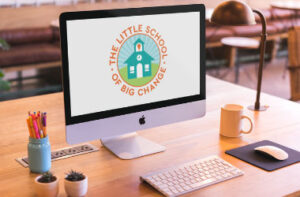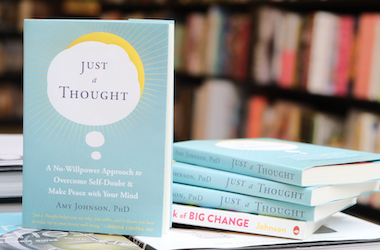I was recently on a call with a bunch of colleagues and found myself in a downward spiral of comparison. As we went around the room reporting on our projects, my thoughts laser-focused on one of my friends: “Wow, she’s really doing well. Everyone seems to respond so well to her. I should be doing more. Why can’t I work as effortlessly as her? Maybe I should just stop.” The call left me wondering about the future of my project, but the real question was how to stop comparing myself to others.
As a society we’ve been conditioned to compare ourselves to others. Starting when we’re young, we boast when we get the bigger cupcake or our parents may praise one sibling for being smarter. We like the love and attention, so we want that bigger cupcake and to be as smart as our sister. Soon we start looking over the fence at our neighbor’s lawn to see how fast it’s growing, instead of focusing on our own. When you start comparing yourself to others, you keep tabs on what others are accomplishing and how you’ve fallen short.
We’ve all felt “less than” or “not good enough” at times in our lives. Over time, these thoughts can lead to feelings of anxiety or even depression as we constantly feel we’re not measuring up. Sometimes we compare ourselves to others in areas that are not even practical or around things we don’t really want. Pushing ourselves can feel like pressure or stress all because we’ve believed a thought in our head that said we need to do or be more.
Someone is always going to have what seems like a bigger house, a better car, the greater relationship. But just as beauty is in the eye of the beholder, your interpretation of what someone else has doesn’t mean it’s true. When you are comparing yourself to others, you can easily assume that the grass is always greener on the other side, but how do you really know? We all have different thoughts about what is considered desirable.
And what does better, greater, bigger even mean? Who exactly is keeping score? And what impact does any of this have on who we are at our essence? These are good questions to keep in mind when considering how to stop comparing yourself to others.
How to Stop Comparing Yourself to Others
Comparison can leave us feeling badly about ourselves and most of us want a quick fix to stop it. But addressing comparison has everything to do with what’s happening in our minds and little to do with anyone else. Becoming aware of the habits that lead to comparison can help us address why it happens and what to do about it.
The Role of Your Mind
Understanding how your mind works can go a long way in helping stop comparing yourself to others. Our minds were designed to protect us from perceived dangers. Back when man was fighting saber-toothed tigers and warring tribes, the mind served us well since it helped us anticipate threats and quickly act. Being able to respond in a timely manner to a danger literally meant life or death for someone and their family. There was an immediate reward for acting fast. Anticipate, act and live to see another day.
While man has modernized and continued to evolve over hundreds of thousands of years, the mind has not. It still wants to protect us from what it perceives as threats, although in present times we are not faced with life-threatening dangers in the same way. Sure, we have crises that arise from time to time, but the mind does not need to always be on high alert. That doesn’t stop the mind from worrying or wanting to anticipate any little thing as a threat. In today’s world, the mind finds danger in every little thing from how your driving test will go a week from now to what if dinner doesn’t turn out well.
With nothing in real time to worry about, the mind will spin and spin, conjuring up stories about what could happen, making us anxious. This is the job of the mind – it is a machine that is designed to look out for our own best interest (even if it doesn’t feel like it). Its job is to create and protect a “me” that is separate from “you” and everyone else. It thus makes sense that the mind would want to protect a “you” by comparing yourself to others. A mind will conjure up where it should be in relation to others to save you from future failure. If it knows all and anticipates all, everything will go well.
In Dr. Amy Johnson’s book Just a Thought she talks about comparing yourself to others: “Comparison is how the mind secures its position as ‘safe’ and ‘enough.’ To a mind, you’re safe only when you know what’s coming. And you’re ‘good enough’ only when you stack up favorably against others or against expectations (also created by your mind) for how you should be.”
Imagine you’re starting a new language class with a group of people. You’re excited, open and looking forward to a new activity. Some students seem to get the accent down quickly while others seem to master the grammar easily. People’s ability to learn the language will naturally vary, but instead of seeing this as the way things are you start judging and comparing yourself to others. At the first sight of a mind-conceived “failure” or falling behind, it starts creating all sorts of stories about why you shouldn’t have started in the first place, how you knew you weren’t naturally good at languages to begin with, etc. Before long, instead of planning your trip to Berlin, you’re thinking about the money you’re going to lose for dropping out of the class.
With a mind so focused on protecting us, how could we not compare ourselves to others? But if we can see that this is just another construct of the machine-like mind, we don’t need to take these comparisons so seriously. We can see these comparisons as simply thoughts that we did not create ourselves but that the brain believes is serving a purpose. And what if we were actually all made equally, with literally the same energy? If that were true, how could anyone ever be better than anyone else?
Notice Your Habits
Nowhere is the opportunity for comparison more available today than on social media. With photos and stories of others’ lives available to you 24 hours a day, social media channels are the perfect platform to make us question our own lives. If you find yourself spending hours scrolling through Instagram, Snapchat or TikTok wishing you had someone else’s life and feeling bad about it, take a phone break and get out of their life and into yours! If you have a scrolling habit, try limiting yourself to an hour a day of screen time or turn your phone off at night so you’re not tempted.
Is it Really That Good?
Although others’ lives on social media may look ideal, it is now common knowledge that people want to show the best of what’s going on in their lives. Otherwise why would social media exist? We rarely see our friends when they feeling lonely, crying or having an argument. We assume everyone is living their best life and we’re the only one who’s not. Can we question if this is really true?
We are all unique beings and all have something to offer. Things that seem to come easily to others may not be your strengths. When you find yourself comparing yourself to others try listing the strengths you have that others notice and that may not come easily to them.
Gratitude
Embrace an attitude of gratitude. What does that mean? Whenever you start worrying about what others have that you don’t, flip the script and look at all that you do have, down to the clean air you breathe and the sheets on your bed. It’s hard to be focused on lack when you’re being grateful for what you have. A good exercise is to think of 3 things you are grateful for everyday and write them down. Note how that gratitude feels in your body.
Comparison takes place in the future. You’re not successful enough and want what someone else does. You want to be as popular as your friend. Can you look at what’s happening in your life right now? What are you doing today that you’re proud of? Can you see the reality of the present moment rather than living in a fake future?
See Your Thoughts
When you notice yourself comparing yourself to others, its common to want to beat yourself up for it. Instead of saying “I shouldn’t feel that way,” can you accept the thought as something that came up and that doesn’t mean anything about you? Can you acknowledge your mind for wanting to protect you as it has for centuries? The thought may come with icky feelings, but there is no danger in these thoughts, despite what our minds may say. We are hardwired to experience these thoughts and let them pass through.
Turn Lemons into Lemonade
When you’re comparing yourself to others, it’s easy to make yourself feel better by finding fault with others, tearing them down, or finding ways you’re superior to them.
Rather than wanting to “get back” at that person in your head, what if you considered the hard work that person took to get where they are? What could you learn from that? If you think someone has a nicer house than yours, how could you take the lessons they’ve learned to get that and modify them to suit your own needs?
At the end of the day, the only way you can really stop comparing yourself to others is to embrace where you are now in life. Our minds want to resist the now and focus on a made-up future where our lives are better. If we can see this resistance to being in the present moment, we can naturally let these feelings come and go. And in that quiet space that comes when we’re not resisting or comparing, we can allow an inner wisdom to appear and make decisions that best suit us – not others.
Freedom from Comparison with Dr. Amy Johnson
Amy Johnson is a psychologist and Change Coach who helps people find freedom from anxiety, habits, insecurity and low self-esteem. She has written several books and leads live courses and group coaching.
Amy Johnson helps find freedom from anxiety through insight and wisdom, not willpower.
One of Amy Johnson’s most popular books is The Little Book of Big Change, about the principles behind the human experience. The Little Book of Big Change shares a unique approach to healing anxiety, worry and insecurity. The Little Book of Big Change will help you understand what is at the root of your anxiety, low self-esteem, and self-destructive habits.
About the Author

Samantha Miller is a certified Change Coach.
You can see more about Samantha and her coaching services here.







